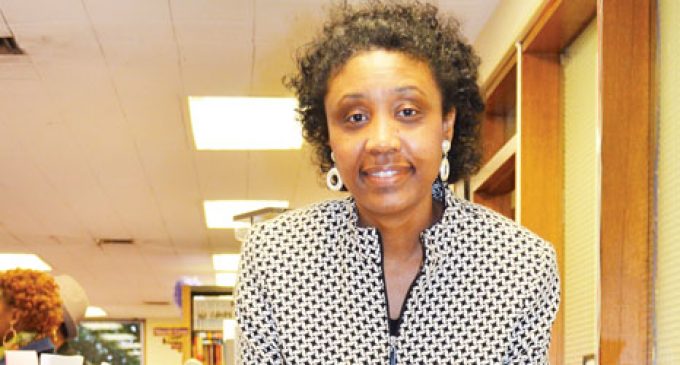Black History Month?

Some say annual celebration has become trite
(pictured above: Yolanda Bolden at the East Winston Heritage Center.)
The black history flood gates opened on Feb. 1 and closes shut again March 1. That is a major gripe among many Black History Months critics.
“Rather than being treated as a separate and limited discipline, divorced by the pigmentation of its subjects from ‘mainstream’ American history, the teaching of black history should hew to the principle of integration. Black Americans are not visitors putting on a cultural show, nor are they legally separated,” Charles C. W. Cooke, an African American editorial associate at the conservative National Review wrote last week.
On the other side of the political spectrum, Goldie Taylor, a columnist at the black news hub The Grio, expressed similar sentiments in a piece entitled, “I Hate Black History Month.”
“I hate Black History Month because, despite what the pseudo colorblind merchants of Americanism will tell you, it is still necessary … more troubling to me is that the rich historical threads that make up the American tapestry are not already embedded in basic curricula,” she wrote.
Local educators say that Black History Month still serves a purpose and that it is needed, as is a greater push to promote the contributions of African Americans year-round.
With all the disparities that plague the African American community, Dr. Amber Baker, principal of Kimberley Park Elementary School, believes educating youngsters about their proud heritage is essential.
“With everything that’s going on today, particularly with our young African American children, to me more now than ever there’s a need to re-establish heritage and pride for where they came from and who they are,” she said. “This freedom that we enjoy, that came at a price, and many young people don’t understand the price that was paid for them to live the way that they actually live.”
 Seekers of African American history can find it at the Malloy/Jordan East Winston Heritage Center, formerly the East Winston branch library, throughout the year, said Branch Manager Yolanda Bolden. The branch hosts programs that celebrate African American heritage whenever possible, Bolden said.
Seekers of African American history can find it at the Malloy/Jordan East Winston Heritage Center, formerly the East Winston branch library, throughout the year, said Branch Manager Yolanda Bolden. The branch hosts programs that celebrate African American heritage whenever possible, Bolden said.
 “I think it’s important for everybody to know the contributions that African Americans have made over the years. I think it’s always good to celebrate those who have done significant work and who have made impacts – black and white,” she remarked. “We celebrate National Women’s History Month in March, we celebrate Latinos during a particular month; it’s a great way to showcase the contributions of any minority group, especially if you’re trying to educate the community to be stronger, to be more knowledgeable, to be more accepting. Why not celebrate those contributions?”
“I think it’s important for everybody to know the contributions that African Americans have made over the years. I think it’s always good to celebrate those who have done significant work and who have made impacts – black and white,” she remarked. “We celebrate National Women’s History Month in March, we celebrate Latinos during a particular month; it’s a great way to showcase the contributions of any minority group, especially if you’re trying to educate the community to be stronger, to be more knowledgeable, to be more accepting. Why not celebrate those contributions?”
Regardless of whether African Americans find their rightful place in American history books, Black History Month is warranted, said Dr. Anthony Parent Jr., a professor of African and African American History at Wake Forest University.
“Even when African Americans are fully included in the narrative history of the US, there will still be a need for African American history, and consequently, months such as the one started by Carter G. Woodson to recognize the unique contributions of African Americans.” declared Parent, the author of three books. “The experience of African Americans has been unique to this country… (and) deserves its own treatment, irregardless of how much we are included in the national narrative.”
In recent decades, there has been “a revolution” with respect to addressing black history in academia, where it has blossomed into departments and the subject of myriad dissertations and academic journal articles, Parent said, but that is a far cry from reaching an equal playing field where all races are given their due – in history books and in society as a whole.
“I think we all want to be seen as American citizens,” he said. “…(But) race is a reality in our world, and until we really do get beyond it, there’s nothing wrong with people recognizing or understanding that people have had to deal with it, that people still have to deal with it.”
If Black America wants its stories told, members of black communities far and wide must demand it, Bolden said.
“It’s something that we all collectively have to do,” she stated. “…There has to be a demand to publish materials on not only African Americans, but anybody you want to know more information about.”
Modern textbooks still lack complete depictions of the contributions made by African Americans, Hispanics and other groups that are recognized with history months, Baker believes.
Although it may not be a perfect system, recognizing Black History Month affords educators an opportunity to share and preserve the legacy of black people, she said.
“Until we have a more accurate and thorough picture of what’s being portrayed, then we’re going to keep having a need for these months,” she said, “because without them, all of it will be lost.”














